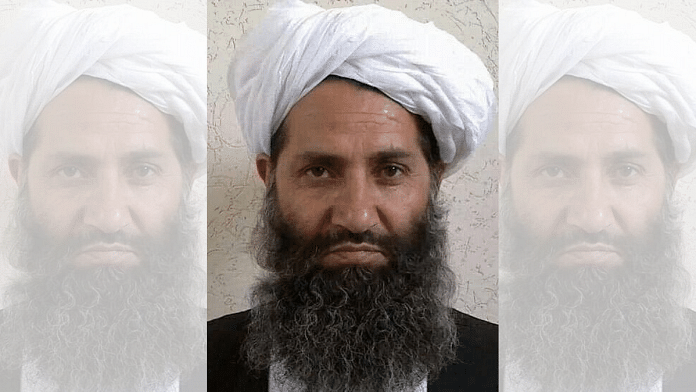New Delhi: A new report by a United Nations Security Council (UNSC) monitoring team has stated that the Taliban leadership is showing no signs of “bending” to pressure for reform, has two factions, and is helping the terror group Tehrik-e-Taliban Pakistan’s (TTP) launch attacks in Pakistan.
The UNSC’s Analytical Support and Sanctions Monitoring Team submitted its 14th annual report about the Taliban’s impact on the security situation in Afghanistan on 1 June, in which it accused the regime of reverting to its “autocratic” policies of the late 1990s.
“The Taliban leadership shows no signs of bending to pressure for reform or compromise, in the hope of earning international political recognition,” the report said, adding that Taliban chief Hibatullah Akhundzada has been “proudly resistant” to external pressure to moderate his policies.
In April 2022, the Taliban had banned the cultivation of poppy and narcotics. However, the UNSC report indicates that this has only driven up the prices of drugs, providing big profits for major farmers. The report added that Taliban officials remain “closely” involved in drug production and trafficking.
On the issue of divergences within the Taliban leadership, the report noted that there were two factions — one based in Kabul and the other in Kandahar — but that cohesion will be maintained over the next couple of years.
Taliban chief Hibatullah Akhundzada, who sits in Kandahar, continues to be reclusive. Last year’s annual report by the UNSC team had noted that handwritten messages, minimal mobile telephone use as well as personal engagements are ways by which the Taliban chief’s location is concealed.
Also Read: Afghan embassy in Delhi becomes battleground for Taliban & previous republic. MEA keeps mum
‘Helping TTP launch attacks in Pakistan’
The TTP has proved to be a growing security nightmare for Pakistan since 2021. Earlier this week, the outfit rejected media reports that it offered peace to the Pakistan government led by Prime Minister Shehbaz Sharif.
In the last year’s report, the UNSC’s Analytical Support and Sanctions Monitoring team said the TTP had “benefitted the most” out of all foreign extremist groups in Afghanistan after the Taliban takeover.
It also claimed that Sirajuddin Haqqani, the Taliban’s acting interior minister and head of Haqqani Network — a Sunni Islamist militant organisation — acted as an intermediary between the TTP and the Pakistan government, so much so that these were known as “Haqqani mediations”.
However, in a first, the latest annual report claimed that the TTP is launching attacks in Pakistan with the Taliban’s help. “The link between the Taliban and both al-Qaida and TTP remains strong and symbiotic,” said the report.
“There are indications that al-Qaida is rebuilding operational capability, that the TTP is launching attacks into Pakistan with support from the Taliban…that operations of ISIL-K (Islamic State Khorasan Province) are becoming more sophisticated and lethal (if not more numerous),” it added.
This is contrary to repeated statements from the Taliban not to allow Afghan soil to be used for attacks against other countries.
Last July, ahead of Eid-ul-Azha, Akhundzada had said: “We assure our neighbours, the region and the world that we will not allow anyone to use our territory to threaten the security of other countries. We also want other countries not to interfere in our internal affairs.”
Also Read: Taliban attended MEA’s online crash course. It might be New Delhi’s new approach of engagement
Kandahar vs Kabul faction
The annual report also highlighted some key differences between the two factions in the Taliban leadership — one that sits in Kabul versus the other in Kandahar.
The Kandahar group are mainly loyalist clerics close to Hibatullah, while the Kabul-based faction represents the Haqqanis. “The Kandaharis are isolationist, more religiously conservative and unmoved by international opinion,” said the report.
The faction in Kabul, meanwhile, is slightly more “pragmatic” and willing to engage internationally in return for recognition and economic assistance.
Two major Taliban officials who diverge on issues are Haqqani and First Deputy Prime Minister, Mullah Baradar. The report claimed that disagreements are “rife” between the two.
This is mainly with regard to competition for government positions and control over financial and natural resources and channels for smuggling commercial goods, the report added.
(Edited by Richa Mishra)



